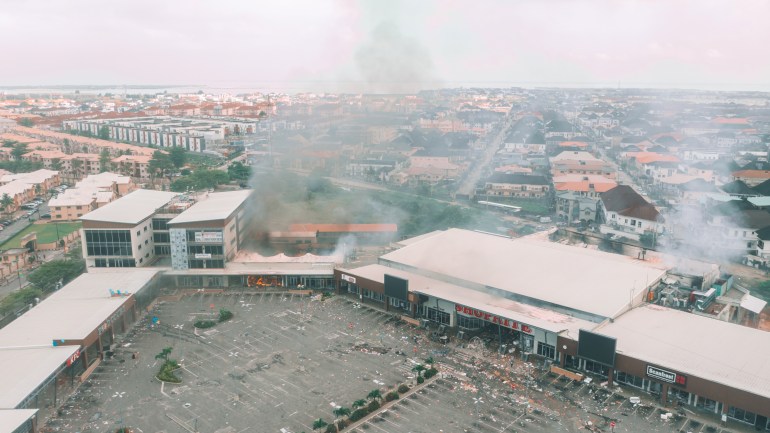Nigerian President Muhammadu Buhari has called for an end to the street protests, while the authorities in the commercial capital of Lagos have scrambled to enforce a curfew aimed at containing anger over the suppression of anti-police protests.
The renewed unrest yesterday, Thursday, in Lagos, the largest city in Nigeria and Africa, with gunshots heard and fire broke out in the city’s central prison after the shooting of demonstrators, which sparked condemnation from several countries.
In a speech to the nation that marked the president's first public statement since the shooting, Buhari urged young men to "stop street protests and constructively engage with the government to find solutions."
Buhari also urged the international community to "know all the facts available" before rushing to make judgments.
Violence escalated
Violence has escalated in Lagos since Wednesday, and witnesses today reported seeing young men - some armed with machetes - marching in parts of the city.
And human rights defender Amnesty International said that military and police personnel killed at least 12 protesters in Lekki and Alusa - another neighborhood in Lagos - last Tuesday.
A store damaged by the unrest in a Lagos neighborhood (Reuters)
Several states in southern Nigeria imposed a curfew after two weeks of confrontations across the country between security services and protesters against police brutality.
On Thursday, the governor of Lagos state said that the Nigerian military had offered to deploy in the state if needed, to protect key companies and government websites, amid anti-police protests.
Condemnation and condemnation
The United States condemned what it described as the excessive use of violence by the Nigerian army.
"We welcome an immediate investigation into the excessive use of violence by the security forces," US Secretary of State Mike Pompeo said in a statement.
"Those involved must be held accountable in accordance with Nigerian law," Pompeo added.
On Thursday, the African Union strongly condemned the violence and called on all parties to give priority to "dialogue".
The United Nations, the European Union and Britain called for those responsible for the killings to be held accountable.
The United Nations High Commissioner for Human Rights, Michelle Bachelet, said that reports of turning off the lights and removing surveillance cameras at the site of the attack indicate that it was "deliberate, planned and coordinated."
Demonstrations took place in South Africa and London to protest the shooting of demonstrators, in which many well-known personalities and celebrities took part, demanding justice for victims of violence in Nigeria.

